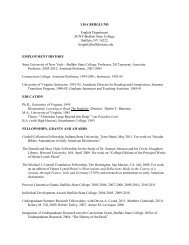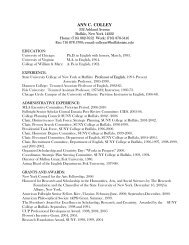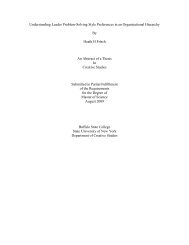POLITICS VERSUS SCIENCE: APPORTIONING ... - Buffalo State
POLITICS VERSUS SCIENCE: APPORTIONING ... - Buffalo State
POLITICS VERSUS SCIENCE: APPORTIONING ... - Buffalo State
You also want an ePaper? Increase the reach of your titles
YUMPU automatically turns print PDFs into web optimized ePapers that Google loves.
But the precautionary principle, as all risk averse interpretations of innovation,<br />
brings a different set of costs. Wildavsky (2000, 40) 5 , for example, argues that innovators<br />
do not have political champions: “To wipe out tangible benefits people already enjoy—<br />
familiar products, traditional jobs, with their identifiable and self-aware constituencies—<br />
is politically more difficult to do then to stop something new that is not yet surrounded<br />
with a self-productive belt of interest.” Because statutes “almost never explicitly address<br />
the lost opportunity costs of screening out of a product,” the consumer shoulders the<br />
costs. Politicians, however, pander to a “clamoring constituency” demanding that<br />
government ensure its safety and, as a result, advocate “specific measures on behalf of<br />
tangible people.” Conversely, scientists offer generalized societal benefits and future<br />
improvements based on scientific discoveries. “You’ll be better off in the ‘by-and-by’,”<br />
Wildavsky observes, “has never been noted as a politically potent appeal.”<br />
Durodié (2000, 163) in his review of European risk regulation writes “implicit<br />
with the Commission’s approach has been the assumption that the precautionary principle<br />
is a zero-cost, or something for nothing option” and “pointing to the fact that science can<br />
never provide definitive answers is hardly a major new discovery, let alone one that<br />
desires to be dressed up with the title of the precautionary principle.” He speculates that<br />
the European public’s embrace of zero-risk may reflect their lack of confidence in<br />
decision-makers rather than science! He argues that the EU’s application of the<br />
precautionary principle has unanticipated consequences for European society (164):<br />
The panic and hysteria created around these issues reflects a far wider loss of<br />
nerve within society rather than any inherent problem with the products<br />
themselves. The real cost will be that of a generation of young people brought up<br />
5 This is a reprint of Wildavsky’s classic article. Morris (2000) includes it as his lead chapter. It serves as<br />
the theoretical ballast in the text’s energetic attack of the precautionary principle.<br />
8












